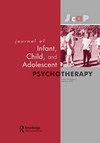Middle Childhood and Beyond: Evolving Psychoanalytic Perspectives on Developmental Tasks and Clinical Work, Post Classical Theoretical Contributions, Neurobiology, and Our Changing Culture
Q3 Psychology
Journal of Infant, Child, and Adolescent Psychotherapy
Pub Date : 2023-04-03
DOI:10.1080/15289168.2023.2210047
引用次数: 0
Abstract
The four articles in this section 1 represent reflections by prominent psychoanalysts on the critical developmental tasks of middle childhood and beyond, whose mastery is essential to healthy adaptions and personality growth at later stages of development as well. Three contributors reconsider the meaning and tasks of the period termed “latency” in light of evolving post classical theoretical contributions, understanding of affect development, neurobiology and significant cultural considerations. Our fourth article contributes a novel framework rooted in affect theory and evolutionary anthropology which is useful in understanding and working with affective instability. Each article presents implications for the developmentally facilitating aspects of the psychoanalytic work, with considerations beyond models which privilege interpretation of unconscious conflict. Beginning with Anne Alvarez’s classic article (2023), “Development toward the latency period: Splitting and the need to forget in borderline children, originally published in 1989 Volume 15 of Journal of Child Psychotherapy ,” we travel with Dr Alvarez as she considers the evolution of her thinking about middle childhood tasks, classical perspectives, and engages us in an exploration and reconsideration of our very understanding of middle childhood (aka latency). She addresses the developmental tasks of that period and changes in the psychoanalytic psychotherapeutic process needed to facilitate maturation in seriously disturbed children. Graham Music (2023), considers the changing nature of the clinical difficulties he sees in recent and current practice with children who are in middle childhood. He explores the important neurobiological changes of middle childhood as well as current cultural shifts which impact and inform the title of his article “Latency? If only: Rethinking middle childhood, its developmental tasks, neurobiology, cultural differences and how trauma and neglect undermines its course.” Barish (2023) once again introduces us to the work of Jaak Panksepp (1998), the renowned neurobiologist who coined the term “Affective neuroscience.” As he has done in previous work on adolescence (Barish, 2020) he explores in experience near and easily accessible terms, his integration of Panksepp’s contributions, the power of affects and his own儿童中期及以后:发展任务和临床工作中不断发展的精神分析观点,后古典理论贡献,神经生物学和我们不断变化的文化
本节中的四篇文章代表了杰出的精神分析学家对儿童中期及以后的关键发展任务的反思,这些任务的掌握对于健康的适应和后期发展阶段的个性成长也是必不可少的。三位贡献者根据不断发展的后古典理论贡献、对情感发展的理解、神经生物学和重要的文化考虑因素,重新考虑了被称为“潜伏期”的时期的意义和任务。我们的第四篇文章提供了一个植根于情感理论和进化人类学的新框架,这对理解和处理情感不稳定很有用。每篇文章都介绍了精神分析工作的发展促进方面的含义,并考虑了无意识冲突的特权解释模型之外的因素。从安妮·阿尔瓦雷斯(Anne Alvarez)的经典文章(2023)开始,“向潜伏期发展:边缘儿童的分裂和遗忘需求,最初发表于1989年的《儿童心理治疗杂志》第15卷,”我们与阿尔瓦雷斯博士一起旅行,她考虑了她对童年中期任务的思考演变,古典观点,并让我们探索和重新考虑我们对童年中期(又名潜伏期)的理解。她阐述了那段时期的发展任务,以及促进严重紊乱儿童成熟所需的精神分析心理治疗过程的变化。Graham Music(2023),考虑到他在最近和目前的儿童中期实践中看到的临床困难的变化性质。他探讨了儿童中期重要的神经生物学变化,以及当前的文化转变,这些变化影响并为他的文章《潜伏期?如果:重新思考童年中期,它的发展任务,神经生物学,文化差异以及创伤和忽视如何破坏它的进程。”Barish(2023)再次向我们介绍了Jaak Panksepp(1998)的工作,Jaak Panksepp是创造了“情感神经科学”一词的著名神经生物学家。正如他在之前关于青少年的工作中所做的那样(Barish, 2020),他以接近和容易理解的术语探索了他对Panksepp的贡献的整合,情感的力量和他自己的力量
本文章由计算机程序翻译,如有差异,请以英文原文为准。
求助全文
约1分钟内获得全文
求助全文
来源期刊

Journal of Infant, Child, and Adolescent Psychotherapy
Psychology-Clinical Psychology
CiteScore
1.70
自引率
0.00%
发文量
37
 求助内容:
求助内容: 应助结果提醒方式:
应助结果提醒方式:


